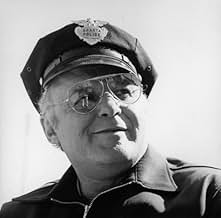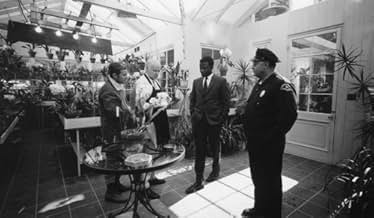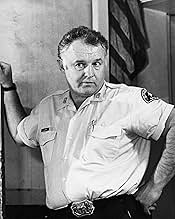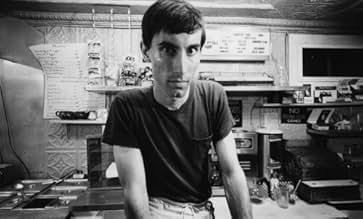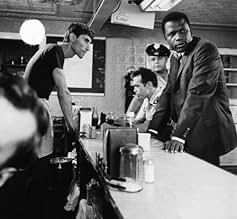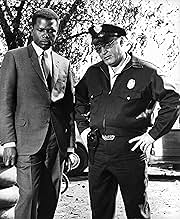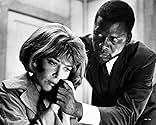A black Philadelphia police detective is mistakenly suspected of a local murder while passing through a racially hostile Mississippi town, and after being cleared is reluctantly asked by the... Read allA black Philadelphia police detective is mistakenly suspected of a local murder while passing through a racially hostile Mississippi town, and after being cleared is reluctantly asked by the police chief to investigate the case.A black Philadelphia police detective is mistakenly suspected of a local murder while passing through a racially hostile Mississippi town, and after being cleared is reluctantly asked by the police chief to investigate the case.
- Won 5 Oscars
- 23 wins & 16 nominations total
- McNeil
- (as William C. Watson)
- Director
- Writers
- All cast & crew
- Production, box office & more at IMDbPro
Featured reviews
Here's my breakdown:
STORY: Up front, it's only lightly dramatic, fueled by the socially-supported bigotry of that era.
What's very clever about this film is the way the story reveals itself in stages.
It's one of the best stories in that regard; it actually just gets better as the film progressives.
If you're not interested in the race struggles of that era then this film may not interest you.
ACTING: Even with a swath of "dumb redneck" characters, the whole cast are believable and hold their characters well.
Of course, Poitier and Steiger are simply awesome on their own and fireworks together. Really superb blend.
TEMPO: An excellent pace with nothing hyper or dull. With Steiger there's a lot of yelling (as was his custom).
CINEMATOGRAPHY: Love old films, and settings all by themselves. If you want to step back into time and literally see what the "Old South" was like, watch this.
DIRECTING / WRITING: Excellent directing and writing ... so much attention to detail and the handling of the subject. My only critique is the screenplay was written by a man who did so primarily for TV, and it occasionally shows.
Is it a very good film? Yes.
Should you watch this once? A must.
Rating: 8.1.
Forty years after the film was made, the racial themes seem just a tad heavy-handed. Whites are always backward and racist. And Tibbs is smart, urbane, and sophisticated. But back in the 1960s, the filmmaker probably did need to be blunt. And the point is made that Blacks and Whites, working together, can accomplish worthy aims, even though old Black Joe is still pickin' cotton at the Endicott Cotton Company.
As a whodunit, the story is fairly good, convenient coincidences notwithstanding. The clue to the killer's identity is pleasantly subtle.
The film's cinematography and production design are terrific. Many scenes take place at night. And the opaque lighting makes for a moody, slightly dangerous look and feel. Loved how they photographed that train moving down the tracks in the Mississippi darkness, a metaphor related to the film's theme. And the sound of a train whistle adds to the mournful realism.
Interiors look authentic. The masking tape that covers rips in a big leather chair in Gillespie's shabby office is so true to life. A single white light bulb hangs down from the ceiling in a small neighborhood grocery store, where the shelves are filled with empty fruit jars. And that greasy spoon called Comptons reeks of 1960's Southern rural reality.
My only complaint with this film is the background music. Some of the jukebox songs are not consistent with the film's overall tone.
"In The Heat Of The Night" is a technically well made, and quite interesting, murder mystery. Yet, it will always be remembered, rightfully, as the film that offered hope of racial harmony, during a decade in which there was none. Its "Best Picture" Oscar award is thus explained.
An Academy Award winner for Best Picture, IN THE HEAT OF THE NIGHT works on so many levels. It's a solid, unpredictable whodunit with beautiful cinematography and crisp direction from Norman Jewison. All the actors are on top of their games, particularly Steiger, whose not-entirely-likable chief gradually looks past his prejudices to warm up to Poitier. Poitier is his usual superb self, once again maintaining his vast dignity as the target of bigotry, much like he did in THE DEFIANT ONES.
And like THE DEFIANT ONES, a key theme in IN THE HEAT OF THE NIGHT is racism. In fact the racism on display here is so fierce and perverse that it's almost hard to believe (though I'm sure it didn't stretch a thing). You can't help but feel an emotional attachment to Poitier as he's subjected to taunts, attempted attacks, and off-color remarks from those who either don't realize the power of their words or don't care. Poitier proves again why he is perhaps the finest African-American actor ever to grace the screen.
IN THE HEAT OF THE NIGHT is one of those movies that, while not perfect, is impossible to dislike. It's classic, though still relevant, entertainment.
Oscars Best Picture Winners, Ranked
Oscars Best Picture Winners, Ranked
Did you know
- TriviaSidney Poitier insisted that the movie be filmed in the North because of an incident in which he and Harry Belafonte were almost killed by Ku Klux Klansmen during a visit to Mississippi. That's why Sparta, IL, was chosen for location filming. Nevertheless, the filmmakers and actors did venture briefly into Tennessee for the outdoor scenes at the cotton plantation, because there was no similar cotton plantation in Illinois that could be used. Poitier slept with a gun under his pillow during production in Tennessee. He did receive threats from local racist thugs, so the shoot was cut short and production returned to Illinois.
- GoofsThe police chase Harvey Oberst through the yellow leaves of an autumn forest, clearly indicating that it is not the middle of summer, as claimed in the movie. This film takes place in September, as indicated by the calendar in the Sheriff's office and not summer.
- Quotes
Gillespie: Virgil? That's a funny name for a nigger boy that comes from Philadelphia. What do they call you up there?
Virgil Tibbs: They call me MISTER TIBBS!
- Crazy creditsNo uppercase ("capital") letters are used in the opening and closing credits, including the film's title, cast and characters, crew and job titles, and company credits.
- Alternate versionsThe VHS prints use the 1982 United Artist variant.
- ConnectionsFeatured in Film Review: Film Review (1967)
- SoundtracksIn the Heat of the Night
Music by Quincy Jones (uncredited)
Lyrics by Alan Bergman (uncredited) and Marilyn Bergman (uncredited)
Sung by Ray Charles
Details
- Release date
- Country of origin
- Language
- Also known as
- Al calor de la noche
- Filming locations
- Sparta, Illinois, USA(Sparta, Mississippi)
- Production company
- See more company credits at IMDbPro
Box office
- Budget
- $2,000,000 (estimated)
- Gross worldwide
- $27,669
- Runtime
- 1h 50m(110 min)
- Color
- Aspect ratio
- 1.85 : 1




